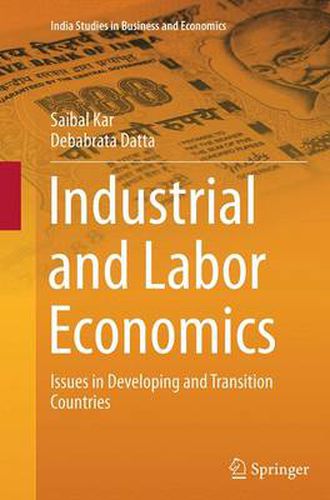Readings Newsletter
Become a Readings Member to make your shopping experience even easier.
Sign in or sign up for free!
You’re not far away from qualifying for FREE standard shipping within Australia
You’ve qualified for FREE standard shipping within Australia
The cart is loading…






This title is printed to order. This book may have been self-published. If so, we cannot guarantee the quality of the content. In the main most books will have gone through the editing process however some may not. We therefore suggest that you be aware of this before ordering this book. If in doubt check either the author or publisher’s details as we are unable to accept any returns unless they are faulty. Please contact us if you have any questions.
This book is an attempt to capture and analyze several idiosyncratic features of industry and labor in the developing world. Available books and graduate-level texts in labor economics largely discuss industrial and labor market situations prevalent in developed countries, where well-defined institutional arrangements and regulations create a very different scope of analysis. The patterns of choice in training and contracts in the labor market more apparent in developing and transition countries are discussed, as are the information-theoretic results. The book also critically examines labor migration, a context in which the developing and transition countries represent large sources in the present global order. A broad base of empirical observations from industries is used to develop analytical conjectures on risk-sharing arrangements between workers and employers, while strong intuitive explanations are combined with relevant mathematical and graphical derivations, ensuring the book’s readability among graduate students pursuing courses in labor economics and industrial economics for developing and transition countries. The book may also serve as a valuable reference guide for all students in advanced human resources courses at management schools. Presenting state-of-the art research findings in all of its chapters, the book discusses numerous institutional peculiarities of the developing world, making the results distinct in view of the general scope of labor economics.
$9.00 standard shipping within Australia
FREE standard shipping within Australia for orders over $100.00
Express & International shipping calculated at checkout
This title is printed to order. This book may have been self-published. If so, we cannot guarantee the quality of the content. In the main most books will have gone through the editing process however some may not. We therefore suggest that you be aware of this before ordering this book. If in doubt check either the author or publisher’s details as we are unable to accept any returns unless they are faulty. Please contact us if you have any questions.
This book is an attempt to capture and analyze several idiosyncratic features of industry and labor in the developing world. Available books and graduate-level texts in labor economics largely discuss industrial and labor market situations prevalent in developed countries, where well-defined institutional arrangements and regulations create a very different scope of analysis. The patterns of choice in training and contracts in the labor market more apparent in developing and transition countries are discussed, as are the information-theoretic results. The book also critically examines labor migration, a context in which the developing and transition countries represent large sources in the present global order. A broad base of empirical observations from industries is used to develop analytical conjectures on risk-sharing arrangements between workers and employers, while strong intuitive explanations are combined with relevant mathematical and graphical derivations, ensuring the book’s readability among graduate students pursuing courses in labor economics and industrial economics for developing and transition countries. The book may also serve as a valuable reference guide for all students in advanced human resources courses at management schools. Presenting state-of-the art research findings in all of its chapters, the book discusses numerous institutional peculiarities of the developing world, making the results distinct in view of the general scope of labor economics.